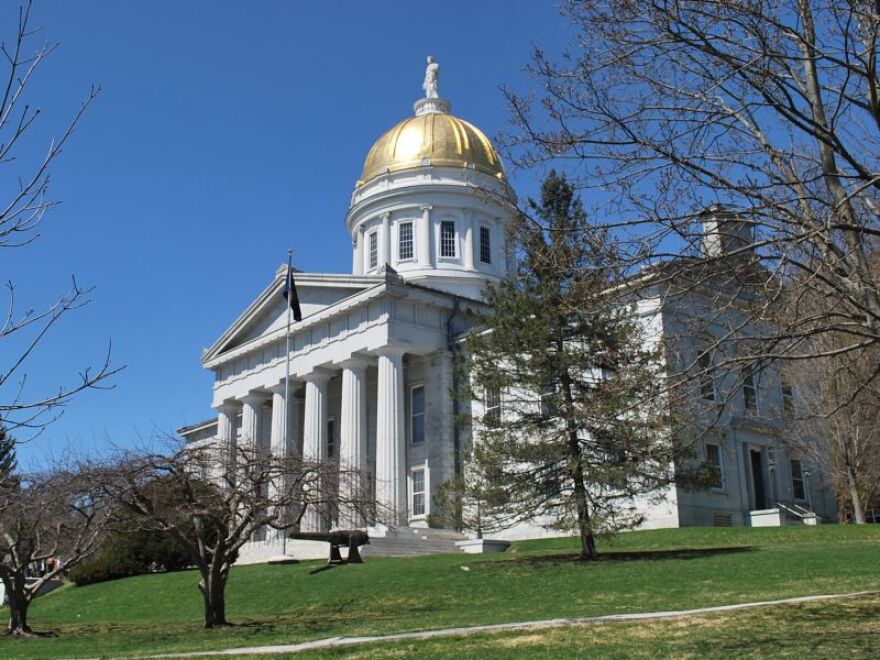The idea of a tax on gasoline and heating oil is politically fraught, to say the least, but one Vermont business group says it’s time for elected officials to embrace the carbon tax.
A few weeks ago, about 50 people turned out at the Old Labor Hall in Barre for a two-hour forum on economic opportunity. Specifically, they came to hear about economic opportunity related to “climate action.”
“We’re in a shifting moment here in Vermont and in the country,” said Daniel Barlow, the public policy director at Vermont Businesses for Social Responsibility.
Barlow’s group, along with the Vermont Natural Resources Council, put on the event. And it’s part of an effort to re-frame the public narrative around government’s role in the reduction of greenhouse gas emissions.
Climate change advocates have long made the environmental case for public policies that reduce those emissions. Barlow’s organization says there’s now an economic imperative as well.
Nearly 20,000 Vermonters now work in jobs related to the “clean energy sector.” And Barlow says the state has done a good job building economic sectors - like solar and energy efficiency - that also reduce carbon emissions.
But there’s one policy above all, Barlow says, that will trigger what VBSR thinks will be a clean energy boom.
"We don't have coal mines here, there's no gas plants, so 90 percent of that money we're spending [on fossil fuels] is going right out of state, into the pockets of folks like Exxon-Mobil." — Daniel Barlow, Vermont Businesses for Social Responsibility
“VBSR is especially interested right now in how we can price carbon in a way that will grow our economy,” Barlow says.
“Pricing carbon” is one phrasing. It’s more often referred to as a carbon tax, especially by Vermont Republicans, who say the proposal, versions of which have been introduced as legislation in Montpelier, would drive up the cost of living for hardworking Vermonters.
Barlow says opponents of the carbon tax have been effective in their messaging, and he says groups like VBSR need to assure working Vermonters that a carbon tax serves their economic interests.
“We want a policy that returns the [carbon] tax money in either tax breaks for dividends to low and moderate income families, and [make sure] it’s a policy that puts them ahead of the game,” Barlow says.
By using tax policy as an instrument for behavioral change, Barlow says Vermont can redirect the $2 billion it now spends on fossil fuels into a local clean-energy economy.
"If you make fossil fuels more expensive in Vermont ... the most immediate and logical reaction of companies is not to invest in alternative fuel sources, but simply to invest in alternative locations." — Bill Driscoll, Associated Industries of Vermont
“We don’t have coal mines here, there’s no gas plants, so 90 percent of that money we’re spending is going right out of state, into the pockets of folks like Exxon-Mobil,” Barlow says.
Not everyone is so bullish on the economic benefits of a carbon tax.
“If you make fossil fuels more expensive in Vermont … the most immediate and logical reaction of companies is not to invest in alternative fuel sources, but simply to invest in alternative locations,” says Bill Driscoll, vice-president of Associated Industries of Vermont.
Driscoll isn’t alone in that assessment. Gov. Phil Scott has reiterated forcefully that he won’t sign off on any proposal that increases the cost of gasoline or heating oil.
Scott says he’s committed to reducing the state’s carbon footprint. He named a "Climate Action Commission” earlier this year, and asked it to come up with ways to reduce the state’s carbon emissions, while improving the economy.
At “listening sessions” held around the state by the commission, many residents have urged the panel to consider a carbon tax in Vermont. Scott, however, says he’s already concluded the carbon tax won’t play any role in that strategy.
“Imposing a carbon tax on our workforce would be detrimental for Vermonters and our state’s economy,” Scott said in a statement issued last month. “As I’ve said many times before, I will veto a carbon tax if it comes to my desk because we cannot make Vermont more affordable by making it less affordable.”
Johanna Miller, the energy program director at Vermont Natural Resources Council, says there’s a compelling pocketbook argument in favor of carbon-pricing policies.
“We can put more money in Vermonters’ pockets by starting to gradually get off of fossil fuels, and that simultaneously does take us significant steps forward in terms of addressing climate change,” Miller says.
And Miller says there are plenty of conservative luminaries who make the same argument. Earlier this year, the former treasury secretaries for Ronald Reagan, George W. Bush and Richard Nixon teamed up on a report called, “The Conservative Case for Climate Dividends.”
And Miller says the carbon tax concept is rooted in the logic of a Republican hero.
“As Ronald Reagan said, ‘If you want less of something, tax it. If you want more of something, subsidize it,’” Miller says.
Whether or not Vermont lawmakers are interested in exploring the case for a carbon tax remains to be seen. Legislators have introduced four carbon-pricing bills so far this year. None have yet gotten a vote in committee.





